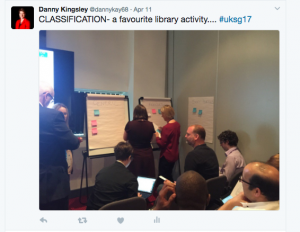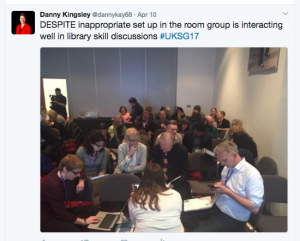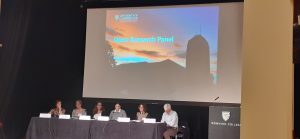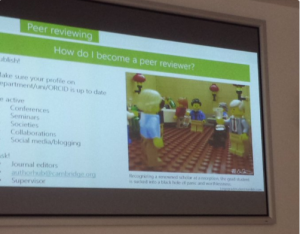Library education needs to teach skills over knowledge to remain relevant into the future, conferences are a useful place to learn about scholarly communication and libraries need to employ a wider range of staff were some of the outcomes from two workshops held at the recent UKSG conference called “Shifting sands: Changing academic library skill sets”. The slides – which include notes from the discussions on both days – are available in Slideshare. The hashtag for the conference is #uksg17
The workshop was held twice, on Monday 10th April and on Tuesday 11th April. The audience on both days consisted of just over 50 people and were primarily library staff with a few publishers and some intermediaries. About half of the people both times had responsibility for hiring staff.
The premise of the workshop was: The nature of academic libraries is changing dramatically. What is the role of the library in a wholly open access world? And what does this mean for our staffing?
The library qualification
According to CILIP”s May 2016 document Qualified library & information professionals in Further Education – Case for Support , qualified librarians have:
- An accredited library and information qualification
- Chartered Membership of CILIP (MCLIP) to demonstrate ongoing engagement with the profession
- A relevant teaching or training qualification is occasionally required
- An IT or e-learning qualification is occasionally required.
So this then raises the question: if Scholarly Communication is becoming an increasingly important part of the work academic libraries do then what do library degrees offer in the way of training in Scholarly Communication?
A SCONUL report that came out in November 2016 – Developing the professionals of the future Views from experts in ‘library schools’ had views from seven universities offering library qualifications. Three did not mention anything related to scholarly communication (University of Ulster, University of the West of England, Robert Gordon University). Aberystwyth University and University College Dublin have new degrees in Digital Curation. Dublin Business School referred to “future library programmes” that “will incorporate modules such as the Research Librarian & the Librarian as Publisher to reflect new roles & activities in the sector”. Only City University London mentioned any scholarly communication specific topics: mentioned “research data management, repository management and digital asset management”.
While not interviewed as part of this report, it is worth noting that the library courses at Sheffield University and UCL do incorporate units relating to scholarly communication.
This paucity of inclusion of scholarly communication instruction flies in the face of a clear need. A 2012 analysis of job announcements identified ‘Scholarly communications librarians’ as a new role for health sciences. Two years later, a paper on scholarly communication coaching noted: “To successfully address the current needs of a forward-thinking faculty, the academic library needs to place scholarly communication competencies in the toolkit of every librarian who has a role interacting with subject faculty.” Five years ago, RLUK published a report Reskilling for Research which identified high skills gaps in nine key areas.
For those of you interested in this topic, the blog Changing roles and changing needs for academic librarians is a literature review of research on the issue of training for librarians.
Activity – Job analysis
 The activity part of the workshop started with the room breaking into groups of four. Each group was given paper copies of a job description. The job descriptions were also available online in a GoogleDoc. The 29 job advertisements have appeared in my in-box over the past two years and were for roles based in the UK that incorporate some aspect of scholarly communication.
The activity part of the workshop started with the room breaking into groups of four. Each group was given paper copies of a job description. The job descriptions were also available online in a GoogleDoc. The 29 job advertisements have appeared in my in-box over the past two years and were for roles based in the UK that incorporate some aspect of scholarly communication.
The participants were asked to identify from the job description the specific knowledge or systems that were being requested, the types of generic library skills the job description was asking for and the type of person they needed.
Attendees were asked to complete an online table, although post-it notes were available for those who preferred. I later transferred these responses into the document.
Discussion – reflections on job descriptions
The groups then were asked to reflect on their analysis and to have a short discussion together considering whether these were the kinds of skills, knowledge and people they are currently employing or working with? They were also asked to discuss the appropriate training source for certain skills and knowledge.
We then opened the floor.
The discussions around the way Scholarly Communication has developed were interesting. In several cases the library only had a copyright person by chance (someone happened to have that knowledge). In others an individual’s interest became a ‘thing’ that then needed to be recruited for because it becomes core. The impression was that it is only very recently that libraries have started seriously thinking strategically about staffing for Scholarly Communication.
There was (not surprisingly) some defensiveness about library qualifications. One person said “Library schools can’t churn people out with these skills because they are always changing”, and another noted that “Learning is episodic – one time learning won’t set you up for your career. These are jobs that don’t even exist yet. They should be teaching critical thinking”. These positions are both correct, however these are not new skills. Repositories have been around for over 12 years.
Another comment echoed this “Things are changing and developing all the time. What you learnt in year 1 of your qualification might be completely irrelevant by the time you do the job.” Courses should lay groundwork and be around flexibility and adaption as much as the knowledge.
The suggestions for new kinds of skills it would be useful for graduates to have included: working as part of a team, advocacy skills, liaison skills, communication, resilience, flexibility, critical thinking and the ability to adapt. One participant suggested it would be more useful to teach librarians customer service skills or relationship management. It was agreed that the university courses need to balance the base information with other types of skills and knowledge.
Professional development options
A component of the RLUK Strategic Priorities 2014-2017 is ‘A Creative Community: Nurturing leadership, innovation and skills throughout our libraries’. This was intended to be implemented by working “with Information Science schools to shape both CPD and professional training for students, fitting them for the challenges presented by modern academic libraries and the changing landscape of higher education”.
However training opportunities remain scarce. In the past couple of months, very few have been advertised. A bibliometrics course in Chicago (at great expense), a digitisation course, a course on licensing, and a catch-all on open access and open science all in London were the only courses I could find at short notice.
There are some options for the keen. The ACRL Scholarly Communication Toolkit is full of good resources and FOSTER offers Key Skills for Open Science and Responsible Research and Innovation. There is even a MOOC on Scholarly Communication.
Indeed much training in the area of scholarly communication occurs at conferences such as UKSG. This is slightly problematic, because each individual’s experience of the same conference can differ widely. It is also difficult to demonstrate value. It is not usual to walk into a job interview with a list of the conferences you have attended.
There is also the problem of some employers not recognising the essential nature of attendance at conferences due to the perception they are ‘a bit of a jolly’. Anyone who has prepared a presentation, presented, live tweeted from that presentation, taken notes during other presentations, kept up a twitter feed on the conference hashtag, ensured the email inbox is not completely out of control, connected with all the colleagues you need to network with and written up blog posts about the event afterwards will tell you this is not very jolly at all.
Change librarians or change the library?
This discussion touches on questions about where librarians see themselves. There is some movement away from the ‘handmaiden’ role towards being a co-investigator. A recent informal question on a discussion list in the UK raised some commentary about what Scholarly Communication was. Half of the libraries who said they were offering services in areas such as open access were calling this ‘research support’ rather than Scholarly Communication. In some instances this was a deliberate choice because they saw Scholarly Communication as driving change and they didn’t wish to be associated with that agenda.
At the UKSG Forum last year Dr Sarah Pittaway presented “When is a librarian not a librarian?” where she argued we need to broaden our definition of ‘librarian’. Diversity is beneficial, she argued. Recently at the RLUK conference the issue of people working in libraries identifying as ‘not a librarian’ was a hot topic of conversation.
So we have a choice – we broaden the definition of library and librarian and bring in colleagues from other areas, or we adapt our existing staff (or both). And this itself is challenging. In a talk in 2015 at Cambridge, Susan Gibbons from Yale University spoke of the project she had undertaken to ensure that all staff have an outreach component of their role. She noted that for some existing staff this was not comfortable – they wanted to be curators. The feeling for these people was they ‘changed the rules on me’. She noted that “Some have come along the outreach path, others have moved somewhere else – and the university helps them with that move.”
Training existing staff in the area of Scholarly Communication is not just going to be culturally difficult. It is nigh on impossible in the absence of training opportunities. At Cambridge we have employed a staff member whose sole job is to address the knowledge and skills gap with our library community through the Supporting Researchers in the 21st Century and Research Support Ambassadors programmes.
Discussion: Challenges for the future
 The participants were then asked to break into their groups again and discuss what the implications of the situation were for hiring processes, current staff and their own practice.
The participants were then asked to break into their groups again and discuss what the implications of the situation were for hiring processes, current staff and their own practice.
In the discussion that ensued (full notes from which have been incorporated into the slides) several issues and suggestions arose:
In terms of the recruitment process, a suggestion was that we should be looking at job descriptions and regularly review them to ensure they stay up to date – to give the opportunity to adapt and change. We also need to be placing our advertisements in different outlets to the ones that are traditionally used by libraries.
There needs to be a relaxation on the need for a library qualification, particularly for people who have years of experience in a related field. It is unlikely someone like that would spend five years getting a new qualification. One person noted they were going to do a course last year, but CILIP said that it was an academic qualification not a professional qualification, so they abandoned it. One person observed that “CILIP is the elephant in the room here”. Another noted that it is possible with CILIP to be an associate or chartered with a significant portfolio.
There was the observation that the requirement for library qualification is moving from ‘essential’ to ‘desirable’ in job advertisements, and some are just asking for experience. One participant said that increasingly library qualifications are less relevant.
The question about learning on the job came up several times. This was widely seen as being the best way, however it causes huge operational issues because of the sunk cost of the staff doing the training. It also implies that everyone is coming in at entry level. One person said they recruit “and there is not a lot of staff out there – it is a significant lack of knowledge. They have to go on a steep learning curve.” One solution for this was a person who hired three part time people to give jobs for year to develop the skills sets.
There was some concern during one of the discussion that the term ‘legacy’ staff had a connotation. In some cases their situation was not of their making. “If there are no opportunities internally then it is limited. Staff can be retrained. Make the best of who you have got”, was the argument. However another person noted that they had had to change job descriptions to get to a point that we can get the kind of person we want through recruitment.
One participant noted that the discussion was very familiar because they had been an e-resources librarian, which was a massive transition. They didn’t feel qualified, got more training from the job and from a graduate traineeship. Their concern was that we were losing the battle again in scholarly communications and library skills have not caught up again. Another observation was that library schools have narrow attitudes and it is difficult to teach skills in curiosity. This is an argument against a formal route. They also suffer from a conflict of interest because of the need to ensure a number of students – there are economic considerations.
Take home messages
It has taken me some time to get to the point of ‘going public’ on this issue. Anecdotally I have heard time and time again the dissatisfaction of librarians with their library degree. But the plural of anecdote is not data.
In an attempt to gather some evidence about where people working in scholarly communication have come from, the Office of Scholarly Communication sent out a survey in September 2016. The hypothesis was: there is a systematic lack of education on scholarly communication issues available to those entering the library profession. This is creating a time bomb skills gap in the academic library profession and unless action is taken we may well end up with a workforce not suited to work in the 21st century research library.
We received over 500 responses to the survey and we are in the process of employing a researcher to analyse findings, but initial findings show that many people working in scholarly communication come from outside the library sector.
Bringing this discussion to UKSG has been very instructive. It is still anecdotal but there are significant numbers of people who feel angry about the time and expense they have had to invest in what has been a ‘useless’ degree.
But the conversation has begun and there is the intention for several bodies in the higher education area to work together to find a solution to this looming skills gap.
Danny Kingsley attended the UKSG conference thanks to the support of the Arcadia Fund, a charitable fund of Lisbet Rausing and Peter Baldwin
Published 12 April 2017
Written by Dr Danny Kingsley



